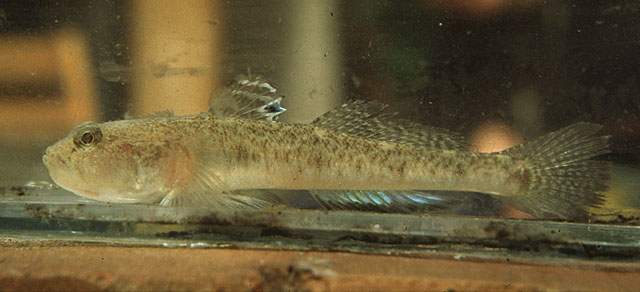| Gobiidae (Gobies), subfamily: Gobionellinae |
| 11 cm TL (male/unsexed); max. reported age: 3 years |
|
demersal; brackish; marine; depth range 4 - 200 m, amphidromous |
| Eastern Atlantic: from Norway to Spain (Ref. 51442); also Mediterranean Sea (Ref. 51442) and Black Sea, but probably not throughout. Pomatoschistus minutus elongatus exists in the Mediterranean and the Black Sea. |
|
Dorsal spines (total): 6-8; Dorsal soft rays (total): 10-12; Anal spines: 1-1; Anal soft rays: 9-12; Vertebrae: 32-34. Elongated body (Ref. 51442). The relative great eyes are placed high and close together (Ref. 51442). Joint pelvic fins forming an oval ventral disc (Ref. 51442). Elongated caudal peduncle (Ref. 51442). Predorsal area and nape covered by scales (Ref. 59043). Scales on the back, in front of the first dorsal fin (Ref. 35388). Dark spot on the hind end of first dorsal fin; Dark area on the front part of pectoral fins indistinct or missing. |
| This occasionally schooling species is found in inshore sandy and muddy areas. Also found in ecotones near hard bottoms (Ref. 92840). Juveniles found in lower estuaries. Mainly diurnal, this species feeds on small polychaetes, amphipods (corophiids, caprellids), cumaceans and mysids (Ref. 4696). Spawns in summer in shallow waters. Male lures the female into an empty bivalve shell where she lays a portion of eggs. Guarded by the male for 10 days until larvae about 3 mm long. Larvae are pelagic at first. Young fish only start to live at the bottom when 17-18 mm (Ref. 35388). |
|
Least Concern (LC); Date assessed: 10 March 2020 Ref. (130435)
|
| harmless |
Source and more info: www.fishbase.org. For personal, classroom, and other internal use only. Not for publication.
